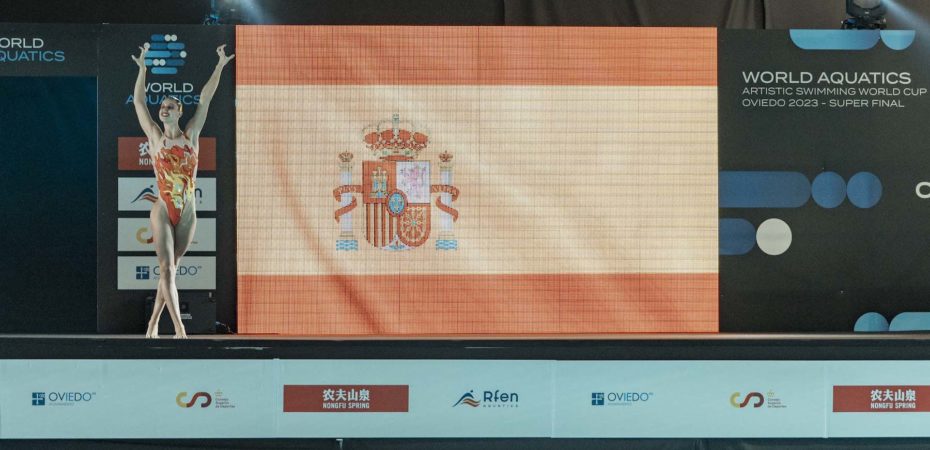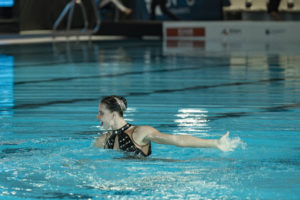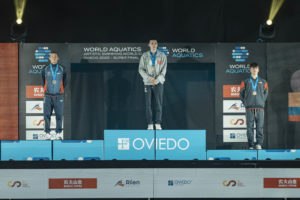Oviedo, Spain, and the Royal Spanish Swimming Federation successfully hosted the Super Final of the inaugural Artistic Swimming World Cup circuit last weekend. 11 nations earned medals across the 11 finals over the three days of competition.
Overall, Spain topped the medal standings, winning nine medals out of the 10 events it competed in, including four golds. Israel further made history by winning two golds in free duet and free team thanks to high difficulty and smart routine construction. Japan won two more golds, while China, Italy and Ukraine all won one gold each.
To recap this Super Final properly, we will review and highlight each event separately, and include numerous quotes from athletes and coaches. First up: the women’s and men’s solos.
Before going further into it, it’s important to note that World Aquatics implemented new factors for the Elements and the Choreography/Musicality scores at this competition. Basically in this new scoring system, the Degrees of Difficulty (DD) of all three Elements (TREs, acrobatics, and free hybrids) are factored, each with their own values, to try to balance everything out and all relative to artistic impression. Similarly, the execution scores for choreography and musicality have been factored, with a value varying depending on the event.
So, the first three World Cups used different factors than in Oviedo (you can find the new ones listed in the Oviedo Highlight on our Instagram account), and it’s thus now inaccurate to compare scores between the meets. Moreover, this change in factoring is why the scores here were overall much lower from what we’d previously seen this season. It is also why the technical routine scores are now mainly higher than the free routine scores.
On the women’s side, Japan’s Inui Yukiko continued to be incredibly consistent, comfortably bringing home two more gold medals. Just like virtually everyone at this competition, Inui increased her DD since her last outing. She upped it by 2.35 in the technical event to reach a total of 31.55, and by 3.05 in the free event for a total of 36.35.
In Oviedo, Inui was the sole athlete to receive full credit in both of her solo routines. Her steadiness throughout the season and clear understanding of the new rules make her a favorite heading into next month’s Fukuoka World Championships, where she certainly intends to defend her World titles in front of her home crowd.
Spain’s Iris Tio won silver in both technical and free solo events. Even though she received a zero on one of her Technical Required Elements (TRE-1a), she still placed second in the former with a score of 239.9299.
In the free solo, the 20-year-old unveiled her new choreography for the first time. With one base mark, she still managed to place second again with a score of 219.1000. Her routine is set to Beyoncé’s live tribute to Stevie Wonder. With this choice, she aimed to get out of her comfort zone and show a different style and expressions.
“I chose this music because I wanted to enjoy my performance, and also do something that everyone can enjoy,” she said. “It’s very energetic and it helps me to have a better swim. It’s very hard with the new rules because there are seven hybrids that we must do. But I still want to enjoy the parts where I can use my arms, where I can look at the judges in the eyes and convince them to give me good scores.”
Tio quite literally transforms the minute she steps on deck. From a reserved and quiet young woman on the poolside, she immediately becomes an athlete that’s impossible to look away from. With an unmatched presence, she grabs everyone’s attention and moves through the water with great flow, taking ownership of the space around her.
“Maybe you don’t see it when I’m competing, but I’m a shy person,” she continued. “This routine is to show growth as a person, to be more expressive and get me out of my zone of comfort. I try to be more like Beyoncé in the water. Not just Beyoncé, but a strong woman with character who is also having fun.”
Audrey Lamothe from Canada won the bronze in both the technical and free events, scoring 239.5017 and 215.0396, respectively. She had notably increased her DD by 4.5 in the former since her last outing in Montpellier.
“I am very happy about this medal, especially as this is my first Super Final,” she said after the technical solo. “My choreography is about love, so I tried to transmit this emotion to the judges. I felt very good swimming it here.”
Another noteworthy performance came from Maria Alavidze from Georgia in free solo. The 16-year-old was the youngest of the field and finished fourth with a score of 170.2478 swimming to the theme of “Lion Mentality.” Alavidze received a base mark here, but still got credited 22.8 in difficulty, already three points higher than her last time out in Soma Bay.
Unfortunately, the reigning European champion Marta Fiedina from Ukraine continued to face difficulties in both solos. She received four base marks in her free routine, and one on her final free hybrid in her technical program. That also was likely her highest-scoring one as her DD went from a declared 30.1 to 22.1.
Since solos are not on the European Games programme, this leaves a few more weeks to the Ukrainian to consolidate her routines and ensure she will get credited for everything at the World Championships.
On the men’s side, gold went to Spain’s Fernando Diaz del Rio Soto in the technical event, and to Italy’s Filippo Pelati in the free event.
After gold in Montpellier and bronze in Soma Bay, Diaz del Rio Soto added another gold to his medal haul with a score of 224.8233. He swam to “Unholy” by Sam Smith, arranged by the team’s musician Salvador Niebla.
“I started very nervous,” he said. “During the warm-up, I didn’t feel very good, but once I was swimming, I got good sensations. I could feel the crowd, and it gave me energy and power to swim better.”
Eduard Kim from Kazakhstan and Gustavo Sanchez from Colombia completed the technical solo podium, with scores of 200.6000 and 198.1767, respectively. Kim later had to scratch from the free solo event due to illness.
At 16 years old, Pelati was the youngest of the men’s field and was the only one to not get any base marks in the free solo final. He scored 178.8417 for his routine set to a cover of “Fallin’” by Alicia Keys.
“I tried to think only about my performance and to express something with my choreography, to everyone who’s watching me,” he said. “And to not think about the apnea or the breathing, only the performance. This music is very strong and gives me a lot of power to swim well from beginning to end. I am very happy to have competed again, especially here in Oviedo in this Super Final.”
Pelati has already competed extensively this year, appearing in three World Cups as well as in both junior and senior Italian national championships. This weekend, he is set to compete at the senior Italian Summer Nationals and, later this summer, hopes to perform at the Junior European Championships and World Youth Championships.
Both Dennis Gonzalez Boneu from Spain and Ranjuo Tomblin from Great Britain competed in the free solo for the first time this season. Despite receiving three base marks, Gonzalez Boneu won bronze with a score of 145.7813 and the highest artistic impression of the field. He swam to the song “Agua, Aire y Fuego” by Nolasco.
“I was very nervous because I spend a lot of time in apnea during this choreography,” he said. “I was trying during the routine to keep my nerves down and to stay focused on doing my best. This crowd and atmosphere gave me a lot of strength, I could really feel it. It was nice to compete here with this audience.”
Although receiving the fourth-best score of the day, Tomblin was not eligible to a Super Final ranking as he had only swam solo in the Montpellier leg. While this competition was open to all, nations had to compete in two World Cup stops in order to be eligible to medals and rankings in this Super Final.
Either way, the 17-year-old was pleased to show and test out his Samurai-themed routine for the first time. He scored 145.0562.
“This is definitely more challenging than a tech routine because there’s so many different hybrids,” he said. “But it’s good to experiment in these World Cups before the big competitions like the World Championships or the European Games [for mixed duet]. It’s nice to feel it out and see if we have the Coach Card right.”
Tomblin chose this theme as he is half-Japanese and he wanted to portray something close to his culture. He undoubtedly looks forward to performing this routine in Fukuoka for the World Championships, in front of what will certainly feel like a home crowd in a way.
Colombia’s Gustavo Sanchez won silver with his “Passion of Christ” routine with a score of 152.7521. Of note, Sanchez has medaled in both solo events across all three World Cup stops he participated in.
Stay tuned for the duet and team recaps from the World Cup Super Final, coming out over the next few days.
ARTICLE BY CHRISTINA MARMET
Cover photo: Omar Rincón-Benzalá / Marilin García (RFEN)
If you’ve enjoyed our coverage, please consider donating to Inside Synchro! Any amount helps us run the site and travel costs to cover meets during the season.



